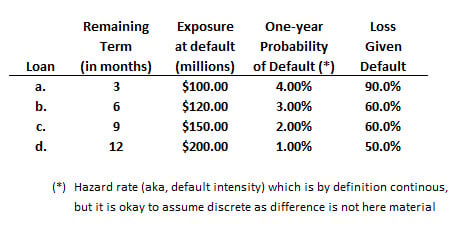Learning outcomes: Define and calculate expected loss (EL). Define and calculate unexpected loss (UL). Calculate UL for a portfolio and the risk contribution of each asset.
Questions:
506.1. Consider the following four short-term loans held by a bank:

Which loan has the highest expected loss in dollar terms? (this question is a variation on FRM Handbook Example 24.3)
a. Loan (a)
b. Loan (b)
c. Loan (c)
d. Loan (d)
506.2. A bank's credit exposure to a customer consists of the following:
a. $2.48 million
b. $3.29 million
c. $4.50 million
d. $7.75 million
506.3. A bank has extended two loans to customers in the same industry. Both loans are have an exposure amount (EA) of $50.0 million, default probability (PD) of 2.0%, loss rate (LR) of 50.0%, and standard deviation of loss rate of 60.0% such that each loan has an expected loss of $500,000 and an unexpected loss of $5.5 million. In this way, the bank's credit portfolio consists of these two credit assets; and the default correlation between the two loans is 28.0%. Which is nearest to the risk contribution of each asset to the portfolio's unexpected loss?
a. $3.33 million
b. $4.40 million
c. $5.37 million
d. $5.50 million
Answers here:
Questions:
506.1. Consider the following four short-term loans held by a bank:

Which loan has the highest expected loss in dollar terms? (this question is a variation on FRM Handbook Example 24.3)
a. Loan (a)
b. Loan (b)
c. Loan (c)
d. Loan (d)
506.2. A bank's credit exposure to a customer consists of the following:
- Exposure amount (EA) is $50.0 million
- Probability of default (PD) is 2.0%
- Loss rate (LR; aka, loss given default) is 50.0%
- Standard deviation of loss rate is 40.0%
a. $2.48 million
b. $3.29 million
c. $4.50 million
d. $7.75 million
506.3. A bank has extended two loans to customers in the same industry. Both loans are have an exposure amount (EA) of $50.0 million, default probability (PD) of 2.0%, loss rate (LR) of 50.0%, and standard deviation of loss rate of 60.0% such that each loan has an expected loss of $500,000 and an unexpected loss of $5.5 million. In this way, the bank's credit portfolio consists of these two credit assets; and the default correlation between the two loans is 28.0%. Which is nearest to the risk contribution of each asset to the portfolio's unexpected loss?
a. $3.33 million
b. $4.40 million
c. $5.37 million
d. $5.50 million
Answers here:
